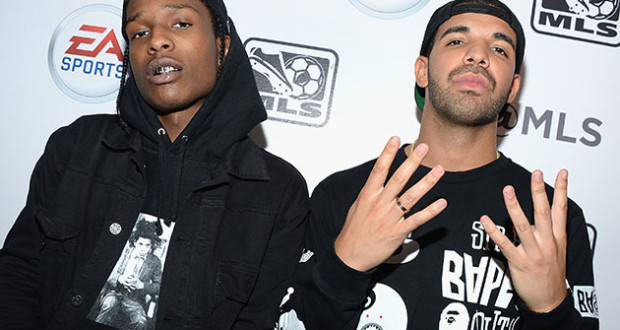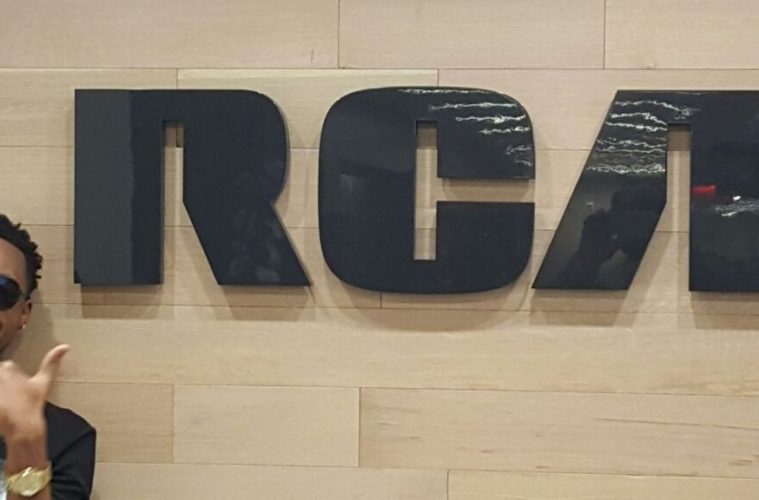Within the space of a week, 3 Africans from the West (Ayo Jay), East (Ali Kiba) and South (Mobi Dixon) signed major record deals. Sub Saharan Africa is beginning to look like one big episode of the Oprah Winfrey show – you get a record deal, you get a record deal, everyone gets a record deal!
Closer to home, I believe Davido’s signing with Sony music will open opportunities for the industry in Nigeria in ways that D’banj’s signing couldn’t – that’s because D’banj’s contract with Sony Music was way ahead of its time. Now is the time!
I do not think many expected the major labels to go a tier or two below OBO and the Kokomaster to find Nigeria’s next top talent, but they did. RCA/Sony added a little-known Afropop/R&B singer that lives in New York to its roster last week, his name is Ayo Jay.
RCA is a flagship label under Sony Music Entertainment, so Ayo Jay and Davido are now labelmates on Sony Music Entertainment. But Sony Music Entertainment West Africa is a division of Sony Music Entertainment (SME) and RCA is a separate label entirely. SME sees growth opportunities within the African continent – the signings of Ali Kiba, Mobi Dixon and Davido confirms the strategy Adam Granite, Sony’s president of Northern/Eastern Europe & Africa outlined earlier in the year –
It’s the early days of smartphones, and some countries are still dealing with basic issues relating to access to power, but we think in the long term there’s a big opportunity… For us it’s about developing in the region and on the continent and finding artists we can sell there.
However, RCA doesn’t have a strong footprint in regions outside of the US, Europe and Australia, so except there’s a hasty rollout in the next few months, Ayo Jay probably wasn’t signed to make the label money in Africa but we’ll see. If this is true, then it explains why RCA is ignoring the fact that Ayo’s commercial value here is still unknown but it doesn’t explain why they’d take a punt on a singer, who’s unquestionably talented but is yet to prove it to listeners in New York where he lives, the US or practically everywhere else.
With a thin fan base and an even thinner music catalogue, Ayo Jay was more likely signed for the promise he has shown than the profits his artistry can make immediately, unlike Davido. Thankfully, there’s no better label for nurturing talent than RCA. Their model of recruiting and developing talent has been studied extensively by industry observers and scholars alike. In her book How Industries Evolve: Principles for Achieving and Sustaining Superior, in trying to explain the label’s long term relationship with its artists, Anita Marie McGahan wrote –
RCA Records, which historically adopted a strategy of signing artists when they were not well known and then working with the artists over many years – often a decade or more – to develop their talents.
The book was released in 2004, RCA is still showing in 2016 that they spend time and resources developing superstars from “nothing” in an era where labels their size are looking for already-made men and women. RCA took Tinashe and Bryson Tiller from child prodigy and ex-Papa John’s employee respectively to multi-platinum recording artists with significant staying power. So history tells us that Ayo Jay could be given time and money to fulfil that promise but the 7-figure record contract that’s been talked about in some sections of the local press punches holes in that “they’ll wait for him to grow” argument. I’ll explain why.
https://www.instagram.com/p/BFXtAENtJOD/?taken-by=iamayojay&hl=en
I’m sure many of us are conversant with the concept of record label advances but if you’re not, just read on, we’ll get to that. Traditional record contracts can contain all sorts of clauses and bonuses in addition to advances. These could inflate the overall value of a deal significantly, so let’s assume that not all of that $1m+ is an advance (and this is a totally hypothetical scenario) Ayo Jay might be awarded $500,000 initially and then an additional $250,000 if he wins a BET or ASCAP Award and an additional $250,000 if his album goes gold etc. These benchmarks vary widely from contract to contract and I hate to sit behind a computer and play god over another man’s life but some of those don’t seem like short term targets for Ayo Jay’s current career trajectory.
Now, let’s even assume that all of that $1m+ was a label advance to Ayo and One Nation. A label advance doesn’t go straight into an artist’s pocket, a label advance is like a loan a record label gives an artist to finance their career and the artist only starts earning money from sales when he pays the label back its money. If you go to the bank and ask for a loan, they use your character, your capital, collateral and your capacity to repay the loan to assess your creditworthiness, don’t they? In the music business creditworthiness is made of stuff that is a little less tangible – raw talent, gut feeling, a cosign from an exec or a superstar artists, an established fan base etc.

ASAP Rocky and Drake
When RCA signed A$AP Rocky for a reported $3 million, his ASAP Mob was buzzing in the streets of Harlem and later got signed to the label as well. When Drake signed with Aspire/Young Money/ Cash Money/Universal for a reported $2 million he was already a big TV star in his native Canada, had a successful mixtape in So Far Gone and received valuable cosigns from Lil Wayne and Birdman. Creditworthiness of this magnitude isn’t easy to justify in today’s cash-tight music climate as it was in the heady days of the 90’s. Both A$AP Rocky and Drake have gone on to have very successful careers within a relatively short period of time but for all its patience, if labels such as RCA do give out big contracts, the pressure on the artist to deliver becomes more intense. As we saw with Trinidad James and his reported $2 million recording contract being cancelled by Def Jam/Universal after he couldn’t follow up 2012’s smash hit “All Gold Everything” with another hit. I’m scratching my head to figure out if Ayo Jay is showing up to a third of the promise of A$AP Rocky or has done half of what Drake did before he signed. Perhaps there’s something I’m missing here?
Nonetheless, congratulations to Ayo Jay, what he has achieved is no small feat. The singer and his team did it mostly by themselves too, so save for a few online platforms like Notjustok and a handful of culture influencers like Asa Asika and Bizzle Osikoya, no one can really say they believed in the kid from the beginning. But it’s not too late to get on board either, Ayo Jay needs the support of music buyers, concert goers, bloggers, journalists and the like both home and abroad to keep his train moving. Nigeria has a small window to showcase its talent to the world and best believe it won’t be open forever, we must do so while it still is. The reward for hard work remains more work.
*This is part of our Ojoro Counsel series – the series features a bunch of legal illiterates dissecting music law and debating intellectual property in a way the common man will understand.*


